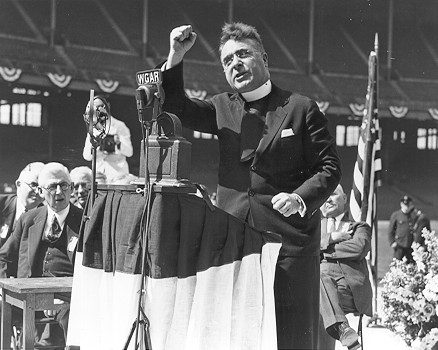
That is patently false.
Stick with G-d, and leave economics to business people. We'll deliver the food because we're self interested in doing so. Alternate economics for delivering food have been much less successful. See China, 1950s, North Korea, recently, etc.
What is the Pope’s preferred price setting mechanism?
If he hasn’t a plan, then STFU.
Jesus said: “You will always have the poor among you, and you can help them whenever you want to.” Mk 14:7
Sorry pope but you appear to be a communista.
Mistranslated again, perhaps.
Man does not live by bread alone.
I’m pretty much alarmed at Pope Francis’ economic illiteracy. This guy isn’t stupid, but he’s in waaayyy over his head, intellectually, failing to recognize that his immediate two predecessors had a knack for such commentary on such a wide range of subjects because they were absolute geniuses, that they could immediately distill truth out of hundreds of conflicting theories.
However, speculation on food prices is the modern equivalent to hoarding, and it is, quote in fact, spectacularly evil. Especially, in this case, because the hoarders aren’t driven by self-preservation, merely pure profit motive.
And while the NCR is more socialist than Catholic, there is no need to adopt socialism to prevent speculation; it’s a problem which has attracted libertarian and other free-market approaches.
My limited knowlege of speculation is that without speculation you won’t have price swings but you will have empty shelves.
Oh, lookie, lookie, lookie! The REAL quote, IN CONTEXT, promotes FREE-MARKET solutions and INDIVIDUAL CHOICES as to how to invest in a more Christian light:
Impact investors are those who are conscious of the existence of serious unjust situations, instances of profound social inequality and unacceptable conditions of poverty affecting communities and entire peoples. These investors turn to financial institutes which will use their resources to promote the economic and social development of these groups through investment funds aimed at satisfying basic needs associated with agriculture, access to water, adequate housing and reasonable prices, as well as with primary health care and educational services.
Investments of this sort are meant to have positive social repercussions on local communities, such as the creation of jobs, access to energy, training and increased agricultural productivity. The financial return for investors tends to be more moderate than in other types of investment.
The logic underlying these innovative forms of intervention is one which “acknowledges the ultimate connection between profit and solidarity, the virtuous circle existing between profit and gift … Christians are called to rediscover, experience and proclaim to all this precious and primordial unity between profit and solidarity. How much the contemporary world needs to rediscover this beautiful truth!” (Preface to the book of Cardinal Gerhard Müller, Povera per i poveri. La missione della Chiesa [“Poor for the Poor.” The Mission of the Church]).
It is important that ethics once again play its due part in the world of finance and that markets serve the interests of peoples and the common good of humanity. It is increasingly intolerable that financial markets are shaping the destiny of peoples rather than serving their needs, or that the few derive immense wealth from financial speculation while the many are deeply burdened by the consequences.
Advances in technology have increased the speed of financial transactions, but in the long run this is significant only to the extent that it better serves the common good. In this regard, speculation on food prices is a scandal which seriously compromises access to food on the part of the poorest members of our human family. It is urgent that governments throughout the world commit themselves to developing an international framework capable of promoting a market of high impact investments, and thus to combating an economy which excludes and discards.

Yeah, but it's the National Catholic Reporter that's being critical of the endorsement. Therefore, FRoaman Catholics will most likely take the opposite position, and advocate for increased regulation.
Related thread:
Catholics 'more likely to back state economic intervention' [European Central Bank study]
how does he feel about corn ethanol?
I must say...
there ARE problems we CAN fix in the structure of the food marketplace
we have zillions of subsidy dollars going into agriculture, it is one of the most powerful lobby groups in WashDC
(dating from the Great Depression before the current one, when the FDR administration wanted to prevent even more massive farm foreclosures....difficult conditions make for problematic laws).
Anyway, for all the good FDR’s programs did in the 1930’s, we still have them today!!!!
AND.... as part of all this, millions of pounds of perfectly good food is deliberately thrown into the garbage by government order.....in order to help “stabilize the agricultural markets” ... this alone constitutes tremendous waste of food
we certainly can ask our Congresscritters to...at the very least...end all this waste of good food! (and then reconsider the larger questions perhaps )
But yes, I, too, am concerned with some of His Holiness’s statements...at least as reported in the mass media. I hope to see a longer quotation soon on this

"I have dedicated my life to fight against the heinous rottenness of modern capitalism because it robs the laborer of this world's goods."

From Wikipedia:
Among the NUSJ's articles of faith were work and income guarantees, nationalizing necessary industry, wealth redistribution through taxation of the wealthy, federal protection of worker's unions, and decreasing property rights in favor of the government controlling the country's assets for public good.[17] Illustrative of his disdain for free market capitalism is his statement
We maintain the principle that there can be no lasting prosperity if free competition exists in industry. Therefore, it is the business of government not only to legislate for a minimum annual wage and maximum working schedule to be observed by industry, but also to curtail individualism that, if necessary, factories shall be licensed and their output shall be limited.[18]
I saw a clever cartoon in the Investor’s Business daily a few weeks ago.
It had the Pope up there on the altar read from the Gospel according to Marx.
Comrade indeed... your post sheds light on that fact. Francis is a liberation theologian from Argentina, plain and simple, a flat out Marxist.
Yet the RF, supposedly a conservative forum, anti-marxist and pro-free market, is flooded with Francis fawners, go figure.
Pope Peron I follows his Argentine roots yet again.
Maybe this paragraph is taken out of context but it sounds to me like he is giving up on church charity and now expecting an all powerful government overlord to see to charity.
How long will it be before he starts promoting abortion and advocating gay marriage?